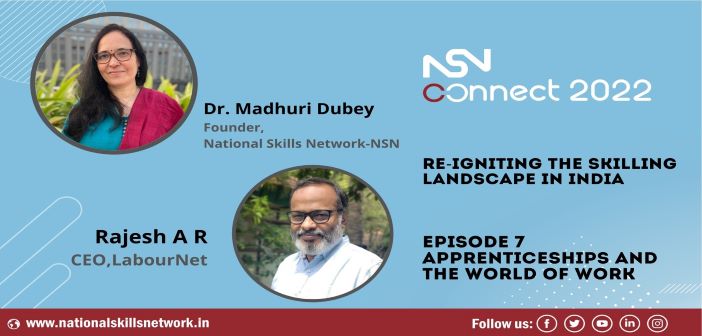The seventh episode of the NSN Connect 2022 series broadly focused on apprenticeships and the world of work.
NSN Connect 2022 on Re-igniting the skilling landscape in India is an initiative by Team NSN to learn about these areas. The esteemed guest of the eight-episode series is Mr. Rajesh A R, CEO, LabourNet who is a thought leader and domain expert who will share his experience and expertise on various aspects that are crucial to re-ignite the skilling landscape in India.
Here is the excerpt from the seventh episode. To watch the full episode, please visit our YouTube channel.
NSN Connect 2022 – Episode 7: The World of work and the world of employment
If you look at the ecosystem, the world of work is defined as self-employment, contract employment, full-time employment or entrepreneurship in the value chain. So, those are the different kinds of employment available in the world of work. In the world of employment, it is defined in the terms of certification and longevity of the programmes they are learning. Industries and academia might not be willing to hire them as it is not work-oriented. The world of work and the world of employment are the two different thought worlds with both pros and cons. The intersection point between the two is the apprenticeship. After acquiring a particular certification in academia, when a student enters the world of work, he/she still needs to get a basic understanding of academic principles.
Apprenticeship adoption in small enterprises in India – challenges
Let’s look at this from two perspectives. In our country, there would be around six lakhs enterprises that are registered. Out of which, 90-95 per cent are in paid-up capital which is lesser than five to six lakhs. These smaller enterprises are not ready to take an apprentice as it is considered an additional burden.
- They will not be able to work as a skilled manpower
- There is no cost arbitrage. He/she comes at the same level of cost and MSME could have hired a person from the informal sector for the same cost.
Therefore, it is considered a burden to train somebody.
Today, in an MSME or any small-scale enterprise, the investment in learning and training is minimal. NAPS calls out for investment into training and there are multiple aspects for the cost as well as the utility of that particular resource. At the same time, the medium-scale and large-scale enterprises’ value becomes more viable. Investing in training an apprentice is much more viable than importing a new machine.
 Industry engagement in apprenticeship and HR awareness
Industry engagement in apprenticeship and HR awareness
There is a transition which is happening in the world of education. Only 20 per cent of training is happening in the classroom in the academic institutions and 80 per cent is happening at the industry sites. In the future, we will find universities having workers or people who are already working as gig workers as a student. This reversal of shift will be for people who have a Diploma. After the basic certification, they will get back to work and become work integrated.
Various activities get accelerated into different connotations but work has to be kept as a core focus. This is bound to happen repeatedly whether for two to five years as the entire transition will leverage industry and academia if used in the right way.
Also Read: NSN Connect 2022 – Re-igniting the Skilling Landscape in India – Episode 6 https://nationalskillsnetwork.in/nsn-connect-2022-re-igniting-the-skilling-landscape-in-india-episode-6/
Three action items
- The coming up with third-party aggregators which act as an intermediary to reach out to the cluster-based MSME.
- Under NAPS, the incentivisation in the MSME sector is required for them to get the first level of objection to ensure that they embrace apprenticeship.
- There is the issue of creating a framework for apprenticeship in India.
Training through apprenticeship is going to initiate more discussion and more action in the coming months.













